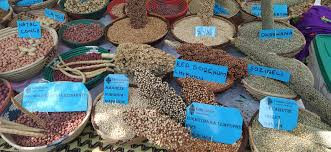
BY KUDAKWASHE TAGWIREYI THE apiculture sector is under threat due to human negligence which includes rampant deforestation and the failure to plant trees.
Apiculture is the keeping of bees especially on a large scale
Addressing delegates at a symposium on pollinators at Gwebi Agricultural College last week, Savannah Delights executive director Selina Chitapi warned that human negligence could have a devastating impact on the bee population in the country.
“Us humans are the precursor to the depletion of bee populations in Zimbabwe and we need to change our behaviour,” Chitapi said.
She pointed out that deforestation as well as the failure to plant trees has an adverse impact on apiculture.
Chitapi castigated the continued plundering of wetlands by some farmers in Muzarabani who were cultivating in wetlands as well as the deforestation occurring in Hurungwe.
“If we are to go to Hurungwe, where there are a lot of Tobacco farmers, there is a lot of deforestation happening there. And the forest cover loss per annum is estimated to be 7 000 in Hurungwe alone,” she revealed.
Chitapi pointed out that this negligence was leading to the depletion of bees, adding that the shortage of bees in any ecosystem spelt disaster for farmers and their livelihoods.
- Chamisa under fire over US$120K donation
- Mavhunga puts DeMbare into Chibuku quarterfinals
- Pension funds bet on Cabora Bassa oilfields
- Councils defy govt fire tender directive
Keep Reading
Principal research officer on pesticides in the Agriculture ministry Kenneth Chipere noted that in some rural communities, unregistered and banned pesticides such as DTT and Termick find their way into Zimbabwe through the country’s porous borders posing extinction threats to pollinator species such as bees which are valued globally for honey and ecological properties.
Some of the pesticides that were banned in Zimbabwe include HCH (mixed isomers), Alachlor and DDT.
The application of agricultural pesticides is also threatening apiculture in Zimbabwe as farmers are applying neonicotinoids which are active substances used in plant protection products to control insects.
Honey bees that are exposed to sublethal levels of neonicotinoids can experience problems with flight and navigation, reduced taste sensitivity, and slower learning of new tasks, all of which impact foraging ability and hive productivity.
In a speech read on his behalf at the symposium, Agriculture permanent secretary John Bhasera challenged researchers to come up with a study to help build knowledge on apiculture.
“May I take this opportunity to urge all those into beekeeping practices to apply best methods and practices which are environmentally friendly for we cannot afford to extinct the honey bee which is one of the common and disciplined pollinators,” Bhasera urged.
In an interview with Newsday on the sidelines of the symposium, Zvimba traditional leader Stanley Wurayayi Mhondoro said honey had a lot of additional values which made it imperative to protect bees.
“These apiary projects are concentrated in very limited farming areas yet in the communal areas there are also bee hives, and all that is going untapped so we need to organise ourselves into a national bee association that keeps bees and process honey,” Mhondoro said.
- Follow us on Twitter @NewsDayZimbabwe











